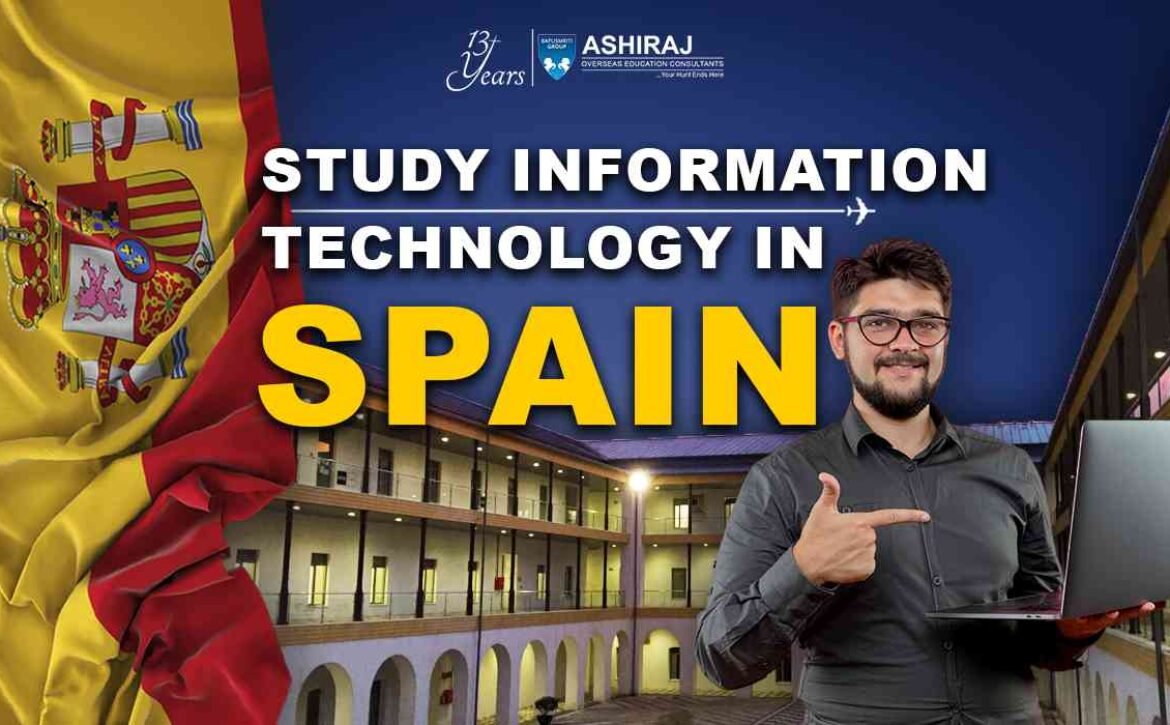
Information Technology in Spain
Spain has experienced a remarkable evolution in Information Technology (IT), propelling the nation into the digital age with vigor. Information technology in Spain has become a cornerstone of modern society, permeating various sectors such as business, education, healthcare, and government. With a burgeoning tech industry and a supportive ecosystem for innovation, Spain has positioned itself as a significant player in the global IT landscape.
The adoption of Information Technology in Spain has catalyzed economic growth, driving efficiency, innovation, and connectivity across industries. From Barcelona’s emergence as a tech hub to Madrid’s thriving startup scene, Spain offers a vibrant environment for tech enthusiasts and entrepreneurs alike. With an emphasis on digital transformation and investment in infrastructure, Spain continues to harness the power of Information Technology to propel itself forward in the digital era.
Why to Study Information Technology in Spain?
- Thriving Tech Ecosystem: Spain boasts a vibrant tech ecosystem with flourishing startups, established tech companies, and research institutions, providing ample opportunities for students to engage with cutting-edge technology.
- Global Recognition: Degrees in Information Technology from Spanish universities hold international recognition, offering students a valuable credential in the global job market.
- Cultural Experience: Studying IT in Spain provides students with not only top-notch education but also an enriching cultural experience, immersing them in the country’s rich history, vibrant culture, and diverse society.
- Opportunities for Innovation: Spain encourages innovation and entrepreneurship, offering students the chance to work on innovative projects and collaborate with industry professionals through internships and research opportunities.
- Networking Opportunities: With numerous tech events, conferences, and meetups happening throughout the country, students studying IT in Spain have ample opportunities to network with professionals, experts, and fellow students in the field.
- Cost-effective Education: Compared to other European countries, Spain offers cost-effective education, making it an attractive destination for international students looking to pursue a degree in Information Technology.
Studying Information Technology in Spain not only equips students with valuable skills and knowledge but also provides a unique and enriching experience that extends beyond the classroom.
Top Universities to Study Information Technology in Spain
University | QS World University Ranking 2023 | Type of University | Average Annual Fees | Programs Offered |
Universidad Politécnica de Madrid | 201-250 | Public | €1,000 – €3,000 | Computer Science, Information Technology |
Universidad de Barcelona | 301-350 | Public | €1,000 – €3,000 | Computer Engineering, Data Science |
Universitat Politècnica de Catalunya | 401-450 | Public | €1,000 – €3,000 | Software Engineering, Cybersecurity |
Universidad Autónoma de Madrid | 451-500 | Public | €1,000 – €3,000 | Information Systems, Artificial Intelligence |
Universidad Complutense de Madrid | 501-550 | Public | €1,000 – €3,000 | IT Management, Web Development |
When considering where to pursue Information Technology in Spain, the choice of university plays a crucial role. Here’s a list of the top universities in Spain for Information Technology, along with their QS World University Rankings 2023, type of university, average annual fees, and programs offered. These universities provide quality education and a diverse range of programs in the field of Information Technology, ensuring that students receive comprehensive training and opportunities for growth and development in this rapidly evolving field.
Course Curriculum for Information Technology in Spain
- Cutting-edge Topics: Information technology courses in Spain cover cutting-edge topics such as cybersecurity, artificial intelligence, big data analytics, and cloud computing, ensuring students stay abreast of the latest advancements in the field.
- Practical Training: The curriculum emphasizes practical training through hands-on projects, internships, and industry collaborations, enabling students to apply theoretical knowledge to real-world scenarios.
- Interdisciplinary Approach: Many programs adopt an interdisciplinary approach, integrating computer science with other fields such as business, engineering, and healthcare, to provide a holistic understanding of IT applications.
- Soft Skills Development: In addition to technical skills, courses focus on developing soft skills such as communication, teamwork, problem-solving, and critical thinking, essential for success in the dynamic IT industry.
- Industry-Relevant Projects: Students often engage in industry-relevant projects and case studies, gaining valuable insights into industry practices and challenges, and enhancing their employability upon graduation.
Information technology in Spain offers a comprehensive curriculum that equips students with the necessary skills and knowledge to thrive in the rapidly evolving IT landscape. With a focus on practical training, interdisciplinary learning, and soft skills development, these courses prepare graduates to make significant contributions to the field of Information Technology.
Eligibility Criteria & Admission Requirements for MS in Information Technology in Spain
- Language Proficiency: Applicants are required to demonstrate proficiency in English through standardized tests such as IELTS or TOEFL. The minimum scores accepted vary by institution but typically range from IELTS 6.0-7.0 or TOEFL 80-100.
- Standardized Tests: Some universities may also require applicants to submit scores for standardized tests such as GRE or GMAT. While specific score requirements vary, a competitive score is typically expected.
- Passport & Student Visa: International applicants must possess a valid passport and obtain a student visa to study in Spain. The visa application process may require various documents, including proof of admission to a Spanish institution, financial documents, and a health insurance certificate.
- Academic Certificates: Applicants must provide academic certificates such as transcripts and diplomas from previous educational institutions. These documents are used to assess academic eligibility for the program.
- Work Experience: While not always mandatory, some programs may require or prefer applicants to have relevant work experience in the field of Information Technology. Work experience can strengthen an applicant’s profile and demonstrate practical knowledge and skills.
Test | Minimum Score |
IELTS | 6.0 – 7.0 |
TOEFL | 80 – 100 |
GRE | Varies |
GMAT | Varies |
Ensuring compliance with the eligibility criteria is essential for prospective students wishing to pursue Information Technology in Spain, as it determines their admission into the desired program and their ability to study and thrive in the academic environment.
Documents Required for Studying Information Technology in Spain
- Passport: A valid passport is essential for international students applying to study Information Technology in Spain. It serves as proof of identity and nationality.
- Letters of Recommendation (LOR): Two letters of recommendation from teachers, professors, or employers are typically required. LORs provide insights into the applicant’s academic or professional abilities and character.
- Statement of Purpose (SOP): An SOP is a personal essay that outlines the applicant’s academic and professional goals, reasons for choosing the program, and how it aligns with their career aspirations in Information Technology in Spain.
- Curriculum Vitae (CV): A CV highlights the applicant’s educational background, work experience, skills, achievements, and extracurricular activities relevant to Information Technology.
- Official High School Transcripts: Transcripts from the applicant’s high school or secondary education institution are required to assess academic performance and eligibility for the program.
- Educational Certificates: Certificates of completion or graduation from previous educational institutions are necessary to verify academic qualifications.
- Work Experience Certificate: If applicable, a work experience certificate detailing the applicant’s professional experience in Information Technology or related fields is required.
- Proof of Financial Resources: Proof of sufficient financial resources, such as bank statements or sponsorship letters, is necessary to demonstrate the ability to cover tuition fees and living expenses during study.
Ensuring the submission of these documents is crucial for a successful application to study Information Technology in Spain, as they provide comprehensive information about the applicant’s background, qualifications, and readiness for the program.
Admission Process for Information Technology in Spain
- Research Programs: Begin by researching universities and programs offering Information Technology in Spain. Consider factors such as curriculum, faculty expertise, facilities, and location.
- Check Eligibility: Review the eligibility criteria for each program, including academic requirements, language proficiency exams (such as IELTS or TOEFL), and standardized tests (GRE or GMAT).
- Prepare Documents: Gather required documents, including passport, letters of recommendation, statement of purpose, curriculum vitae, official transcripts, educational certificates, work experience certificates, and proof of financial resources.
- Submit Application: Complete the online application form for your chosen program and university. Ensure all required documents are uploaded or sent by mail before the application deadline.
- Pay Application Fee: Pay the application fee, if applicable, as per the university’s instructions.
- Wait for Admission Decision: Wait for the university to review your application. Admission decisions may take several weeks to months, depending on the institution.
- Acceptance and Visa Process: Upon receiving an offer of admission, accept the offer and begin the student visa application process. Follow the instructions provided by the university and the Spanish consulate or embassy in your home country.
- Arrival and Enrollment: Once the visa is approved, make travel arrangements to Spain. Attend orientation sessions and complete enrollment procedures at the university before the start of classes.
Following these steps diligently ensures a smooth admission process for studying Information Technology in Spain, opening doors to a world-class education and exciting opportunities in the field.
“Education is the most powerful weapon which you can use to change the world.”
Nelson Mandela
Cost of Information Technology Course in Spain
- Tuition Fees: Tuition fees for Information Technology programs in Spain vary depending on the university, level of study, and whether the institution is public or private. On average, annual tuition fees range from €1,000 to €3,000 for EU students, while non-EU students may pay higher fees.
- Living Expenses: The cost of living in Spain varies by city, with larger cities like Madrid and Barcelona generally being more expensive than smaller towns. Estimated monthly living expenses, including accommodation, food, transportation, and miscellaneous costs, range from €800 to €1,200.
- Accommodation: Accommodation options in Spain include university dormitories, shared apartments, or private rentals. Costs vary depending on the location and type of accommodation, with rents typically ranging from €300 to €700 per month.
- Health Insurance: Health insurance is mandatory for all students in Spain. EU students can use the European Health Insurance Card (EHIC), while non-EU students must purchase private health insurance, which costs around €800 to €1,200 per year.
- Other Expenses: Additional expenses may include study materials, transportation, entertainment, and travel. Budgeting for these expenses is essential to manage finances while studying Information Technology in Spain.
Understanding the cost of studying Information Technology in Spain helps prospective students plan their finances effectively and make informed decisions about their education abroad.
Scholarships for Information Technology Courses in Spain
Scholarship Name | Amount | Application Deadline |
La Caixa Foundation | Up to €18,000 per year | February 1st |
Spanish Ministry of Education, Culture, and Sport | Varies | March 15th |
Erasmus+ Programme | Varies | April 30th |
Fundación Carolina | Varies | April 30th |
Santander Scholarships | Varies | May 15th |
Scholarships play a crucial role in making education accessible for students pursuing Information Technology in Spain. Here’s a list of scholarships available for international students, along with their respective amounts and application deadlines. These scholarships offer financial assistance to students, covering tuition fees, living expenses, and other educational costs, enabling them to focus on their studies and excel in their chosen field. Prospective students are encouraged to explore these opportunities and apply before the deadlines to maximize their chances of receiving financial support for their studies in Information Technology in Spain.
Career Opportunities After Information Technology in Spain
Job Profile | Average Salary (per year) |
IT Manager | €45,000 – €70,000 |
Software Developer | €30,000 – €50,000 |
Data Analyst | €35,000 – €55,000 |
Cybersecurity Analyst | €40,000 – €65,000 |
Network Engineer | €35,000 – €55,000 |
Information technology in Spain offers a wide array of career opportunities for graduates, spanning various roles and industries. Here’s a table highlighting some popular job profiles in the field of Information Technology in Spain, along with their average salaries per year. These roles encompass diverse areas such as IT management, software development, data analysis, cybersecurity, and network engineering. With a competitive salary range, ample job prospects, and opportunities for career advancement, Information Technology professionals in Spain can build rewarding and fulfilling careers in this dynamic field. As the demand for skilled IT professionals continues to grow, graduates with expertise in Information Technology can explore diverse career paths and contribute to the innovation and development of the IT industry in Spain.
Frequently Asked Questions About Information Technology in Spain
Some top universities for Information Technology in Spain include Universidad Politécnica de Madrid, Universidad de Barcelona, and Universitat Politècnica de Catalunya.
Yes, there are scholarships available for international students, such as the La Caixa Foundation Scholarship and the Erasmus+ Programme Scholarship.
The average cost of studying Information Technology in Spain ranges from €1,000 to €3,000 per year for tuition fees, with additional expenses for living costs.
Most universities require international students to demonstrate proficiency in English through tests like IELTS or TOEFL, with minimum scores varying by institution.
Graduates in Information Technology can pursue various job roles such as IT manager, software developer, data analyst, cybersecurity analyst, and network engineer, with competitive salary ranges.
The duration of Information Technology programs in Spain varies, typically ranging from three to four years for a bachelor’s degree and one to two years for a master’s degree.
Yes, many universities in Spain offer internship programs that provide students with practical experience and industry exposure in Information Technology.
Requirements for a student visa include admission to a Spanish institution, proof of financial resources, health insurance, and a clean criminal record.
Yes, international students are allowed to work part-time while studying in Spain, typically up to 20 hours per week during the academic year and full-time during holidays.
Yes, many universities in Spain offer PhD programs in Information Technology for students interested in advanced research and academic careers in the field.




